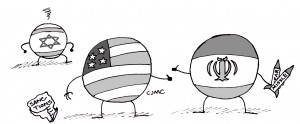Over the last few weeks, dozens of UR students have contacted the office of Senator Kirsten Gillibrand to urge her to co-sponsor the bipartisan “Nuclear Weapons-Free Iran Act of 2015.” Similarly, next month, a group of five UR students will travel to the AIPAC Policy Conference in Washington, D.C. alongside 2,400 students from 490 campuses nationwide to meet face-to-face with their respective congressional representatives and advocate on behalf of this vital bipartisan legislation. This diverse group of students supports this bipartisan legislation because it will strengthen the bargaining position of America and its allies in the diplomatic negotiations now taking place in Vienna concerning Iran’s dangerous nuclear program.
The bill would re-apply stiff economic sanctions on Iran, the prior effect of which forced Iran to negotiate in the first place. It vehemently pressures Iran to reach a deal with the United States and its allies in the Vienna negotiations by the March 24 deadline. If no agreement between Iran and the United States and its allies is signed by March 24, it will be the third such deadline for concessions and an agreement that has been violated by the Iranians. Only an effective combination of diplomacy and aggression can bring about a deal that can prevent another conflict in the Middle East.
Great humanitarian crises already exist within Iran that oppose western morality and policy; Iran’s Supreme Leader, Ayatollah Ali Khamenei, has referred to America as “Great Satan” and has referred to gender equality as “one of the biggest mistakes of western thought.” Iran has been behind numerous terrorist attacks, including the 1994 bombing of a Jewish community center in Argentina that killed 85 people and a 2011 plot to kill Saudi Arabia’s Ambassador to the United States in Washington, D.C. Iran’s proxy organization, Hezbollah, a United Nations-recognized terrorist organization, is fighting on the side of the Assad regime, which used chemical weapons against its own people in the Syrian Civil War.
A nuclear Iran could start a nuclear arms race across the Middle East. Saudi Arabia, Jordan and Egypt, countries that surround Israel and threaten its security, could all pursue nuclear weapons to balance out a nuclear Iran. Syria and Iraq both crumbled under the weight of attacks by terrorist groups such as ISIS; consequently, greater nuclear proliferation in the Middle East could result in nuclear weapons falling into the hands of terrorist organizations.
For these reasons, the students in our group are thrilled to join the world’s political leaders at the AIPAC conference this March to advocate for legislation against one of the world’s most dangerous regimes’ acquisition of the world’s most dangerous weapons.
Livingston is a member of the class of 2018.
Prince is a member of the class of 2019.






